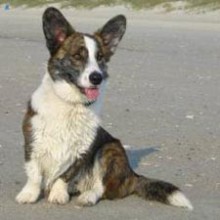Welsh Corgi (Cardigan)
Lifestyle Needs

The Cardigan Welsh Corgi is a small dog with a big personality and a big voice. The Cardigan is said to be more reserved than the Pembroke, but very loyal to his owner. He is a companion dog who will adapt to most lifestyles, although he would appreciate a garden if possible. Despite his short legs he does need daily exercise. His dense coat keeps him warm and dry and should be groomed regularly.
Genetic Diversity
(Known as Coefficient of Inbreeding: 'COI'. It should be as low as possible.)
The UK Kennel Club breed average COI is 10.0% - See 'A Beginners Guide to COI'
Gene Pool Size
(Known as Effective Population Size: 'EPS')
125.6
EPS is a measure of how many individuals are contributing genetically to a breed population. It is a measure of the size of the gene pool in a breed. Lower than 100 is considered critical by conservationists and below 50 brings a breed close to extinction. For more information see the Kennel Club article.
Health and Welfare Problems due to Conformation
(Body shape and physical characteristics)
- Disproportionate shortened and curved leg bones due to Chondrodysplasia.
BVA/KC Health Schemes: www.bva.co.uk/chs
- Hip dyplasia: breed mean 5 year mean score 21.7 (this is very high – parents should be much lower)
- Eye disease: Progressive retinal atrophy (PRA) (annual testing); Retinal pigment epithelial dystrophy (RPED) (annual testing)
Estimated Breeding Values (EBVs) : No EBVs are currently available for this breed
www.thekennelclub.org.uk/about-ebvs
DNA Tests Available
DogWellNet and IPFD Harmonisation of Genetic Testing for Dogs (HGTD)
www.dogwellnet.com/breeds
- Progressive Retinal Atrophy (PRA- rcd 3 )
- Chondrodystrophy (Type 1 IVDD)
- Exercise induced collapse (EIC)
- Degenerative myelopathy
Availability of a DNA test does not mean that it is always necessary or even desirable for breeders to use this test.
Other Breed-Specific Health Screening Schemes
None known
Ask the breeder to show you the certificates for the above tests/screening for both parents. If any of the above tests have not been considered necessary by the breeder (and there may be good reasons), ask her to explain why.
Other Diseases Reported
(For which there are currently no genetic or screening tests for sire or dam)
- Urolithiasis
- Heart disease: Patent ductus arteriosus
- Cancer: lymphoma
Ask the breeder about the medical history of the parents, grandparents and great grandparents. Consider carefully whether to purchase a puppy if some of these or other diseases are in the family line.
Ask about the breeder’s policy in cases of serious genetic diseases occurring to your puppy in later life. Good breeders will request to be informed of such events in order to improve future breeding decisions.
You are strongly advised to buy from a breeder who uses (or is prepared to use) the AWF Puppy Contract and Puppy Information Pack (PIP): www.puppycontract.org.uk
The breeder should also be familiar with the CFSG/DBRG Code of Practice for Dog Breeding